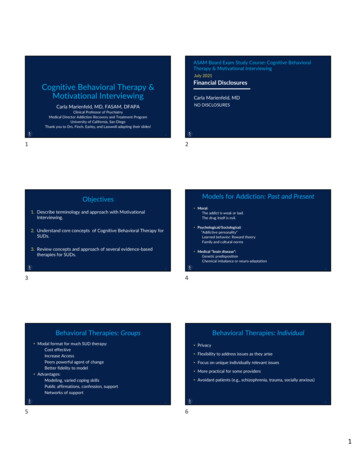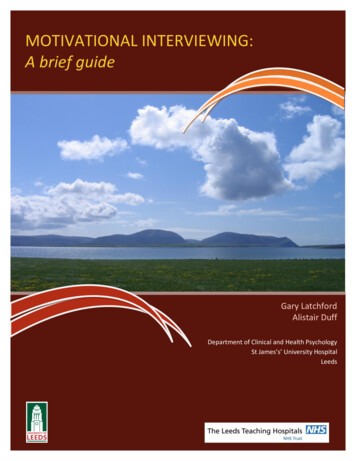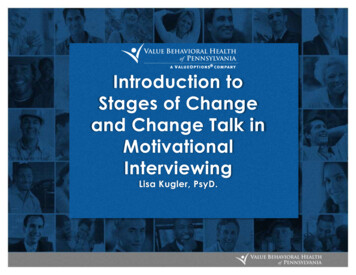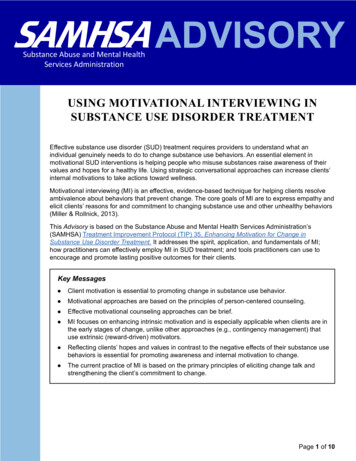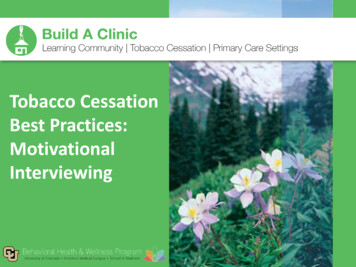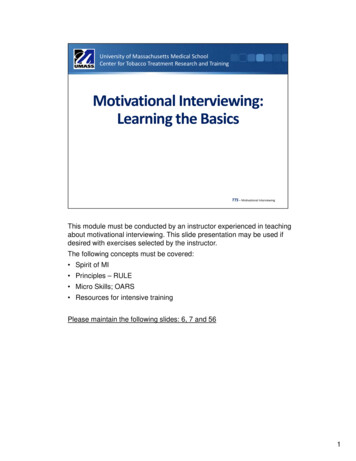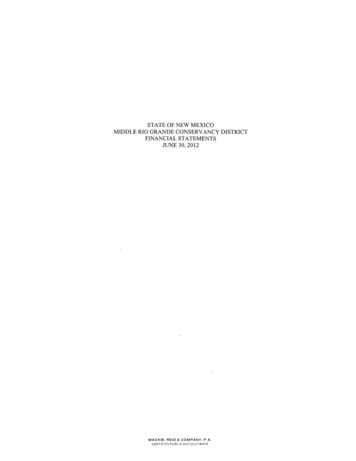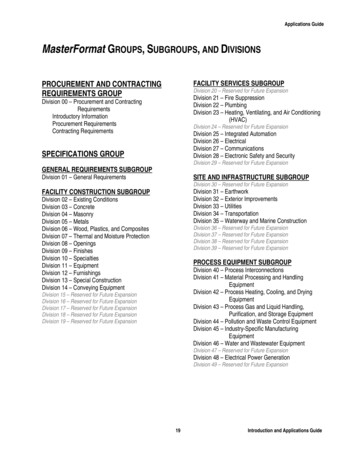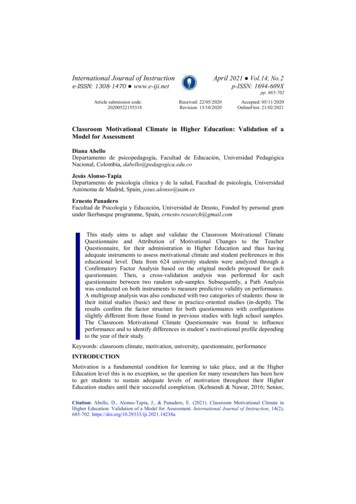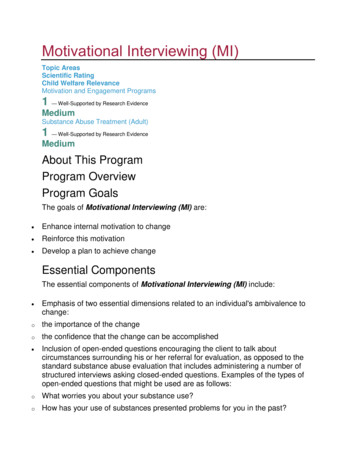
Transcription
Motivational Interviewing (MI)Topic AreasScientific RatingChild Welfare RelevanceMotivation and Engagement Programs1 — Well-Supported by Research EvidenceMediumSubstance Abuse Treatment (Adult)1 — Well-Supported by Research EvidenceMediumAbout This ProgramProgram OverviewProgram GoalsThe goals of Motivational Interviewing (MI) are: Enhance internal motivation to change Reinforce this motivation Develop a plan to achieve changeEssential ComponentsThe essential components of Motivational Interviewing (MI) include: Emphasis of two essential dimensions related to an individual's ambivalence tochange:othe importance of the changeothe confidence that the change can be accomplished Inclusion of open-ended questions encouraging the client to talk aboutcircumstances surrounding his or her referral for evaluation, as opposed to thestandard substance abuse evaluation that includes administering a number ofstructured interviews asking closed-ended questions. Examples of the types ofopen-ended questions that might be used are as follows:oWhat worries you about your substance use?oHow has your use of substances presented problems for you in the past?
oWhat kinds of things would need to happen to make you consider changing yoursubstance use?oWhat are the things that would prevent you from changing your substance use?oWhat are your concerns about entering substance abuse treatment at this time? Utilization of reflecting listening statements that focus on the client’s languagearound change. The goal is to evoke from clients their own reasons, needs,desire, and abilities to change.Program DeliveryAdult ServicesMotivational Interviewing (MI) directly provides services to adults (regardless ofwhether they are parents or caregivers) and addresses the following: Substance abuse or dependence and other health/lifestyle behavior changeissuesRecommended Intensity:Usually 1-3 individual sessions, 2-3 sessions are preferredRecommended Duration:30-50 minutes each session; brief interventions have also been supported byresearchDelivery SettingsThis program is typically conducted in a(n): Community Agency Hospital Outpatient Clinic Residential Care FacilityHomeworkThis program does not include a homework component.
LanguagesMotivational Interviewing (MI) has materials available in languages other thanEnglish:Bulgarian, Chinese, Czech, Danish, Dutch, Estonian, French, German, Greek,Hebrew, Italian, Japanese, Korean, Portuguese, Romanian, Spanish, Swedish,TurkishFor information on which materials are available in these languages, please check onthe program's website or contact the program representative (contact information islisted at the bottom of this page).Resources Needed to Run ProgramThe typical resources for implementing the program are:A room to conduct the sessionEducation and TrainingPrerequisite/Minimum Provider QualificationsThere are no minimal educational requirements to be trained in MI.Education and Training ResourcesThere is a manual that describes how to implement this program , and there istraining available for this program.Training Contact: Melinda Hohman, PhDmhohman@mail.sdsu.eduTraining is obtained:Training can be provided on-site. Follow-up feedback and coaching can bedelivered effectively by telephone. The websitehttp://www.motivationalinterviewing.org/ contains a list of trainers by state alongwith current training offerings.Number of days/hours:Please see al-interviewingtraining for more information.
Implementation InformationPre-Implementation MaterialsThere are no pre-implementation materials to measure organizational or providerreadiness for Motivational Interviewing (MI).Formal Support for ImplementationThere is formal support available for implementation of MotivationalInterviewing (MI) as listed below:Melinda Hohman, see contact information at end of entry, has a list of trainerswho provide formal support and coaching.Fidelity MeasuresThere are fidelity measures for Motivational Interviewing (MI) as listed below:The Motivational Interviewing Treatment Integrity (MITI) is an instrument thatyields feedback that can be used to increase clinical skill in the practice ofmotivational interviewing. The MITI measures how well or how poorly apractitioner is using MI and can be found on casaa.unm.edu/download/miti.pdf.Coding resources to measure fidelity can be found ion Guides or ManualsThere are implementation guides or manuals for Motivational Interviewing (MI)as listed below:The Motivational Interviewing Assessment: Supervisory Tools for EnhancingProficiency (MIA-STEP) package is a collection of tools for mentoring counselorsand other clinicians in the use of MI skills during clinical assessments. MIA-STEPwas produced by The Addiction Technology Transfer Center (ATTC) Networkunder a cooperative agreement from the Substance Abuse and Mental HealthServices Administration's (SAMHSA) Center for Substance Abuse Treatment(CSAT) and the National Institute on Drug Abuse (NIDA). This document can befound at ult/files/mia-step.pdf.Research on How to Implement the Program
Research has not been conducted on how to implement MotivationalInterviewing (MI).Relevant Published, Peer-Reviewed ResearchThis program is rated a "1 - Well-Supported by Research Evidence" on theScientific Rating Scale based on the published, peer-reviewed researchavailable. The program must have at least two rigorous randomized controlledtrials with one showing a sustained effect of at least 1 year. The article(s) belowthat reports outcomes from an RCT showing a sustained effect of at least 1 yearhas an asterisk (*) at the beginning of its entry. Please see the Scientific RatingScale for more information.Child Welfare Outcome: SafetySeveral meta-analyses have been conducted on the effects of MI: Burke, B. L., Arkowitz, H., & Menchola, M. (2003). The efficacy of motivationalinterviewing: A meta-analysis of controlled clinical trials. Journal of Consultingand Clinical Psychology, 71, 843-861. doi:10.1037/0022-006X.71.5.843 Hettema, J., Steele, J., & Miller, W. (2005). Motivational interviewing. AnnualReview of Clinical Psychology, 1, 91111. doi:10.1146/annurev.clinpsy.1.102803.143833 Vasilaki, E., Hosier, S., & Cox, W. (2006). The efficacy of motivationalinterviewing as a brief intervention for excessive drinking: A meta-analytic review.Alcohol and Alcoholism, 41, 328-335. doi:10.1093/alcalc/agl016 Lundahl, B. W., Kunz, C., Brownell, C., Tollefson, D. & Burke, B. L. (2010). Ameta-analysis of Motivational Interviewing: Twenty-five years of empiricalstudies. Research on Social Work Practice, 20, 137160. doi:10.1177/1049731509347850*Baer, J. S., Marlett, G. A., Kivlahan, D. R., Fromme, K., Larimer, M. E., &Williams, E. (1992). An experimental test of three methods of alcohol riskreduction with young adults. Journal of Consulting and Clinical Psychology,60(6), 974-979. doi:10.1037/0022-006X.60.6.974Type of Study: Randomized controlled trialNumber of Participants: 134Population:
Age — Mean 21.2 years Race/Ethnicity — 91% White, 4.5% Asian, less than 1% Black, Latin American,or Native American Gender — 52% Female Status — Participants were student volunteers recruited through the media.Location/Institution: Not specifiedSummary: (To include comparison groups, outcomes, measures, notablelimitations)This study examined the efficacy of Motivational Interviewing (MI) on alcoholrisk reduction programming for young adults. Volunteers were required to reportat least one alcohol-related problem on the Michigan Alcoholism Screening Test(MAST). Participants were randomly assigned to receive meetings in aclassroom format (six 90-minute sessions), six self-help reading units, or MI.After the interventions, drinking was monitored with the Daily DrinkingQuestionnaire at 3, 6, 12, and 24 months. Compliance varied across treatmentconditions, with the fewest participants completing the self-help condition, andthe most completing the MI condition. Due to lack of compliance, the self-helpcondition was not included in the final analysis. Participants in both theclassroom and MI conditions showed reductions in drinking rates, which weremaintained at two years, with the exception of a temporary increase when 20year-old participants reached the legal drinking age. Limitations include lack ofan assessment-only control group and generalizability due to ethnicity.Length of postintervention follow-up: 2 years.*Baer, J. S., Kivlahan, D. R., Blume, A. W., McKnight, P., & Marlatt, G. A.(2001). Brief intervention for heavy drinking college students: 4-year follow-upand natural history. American Journal of Public Health, 91(8), 13101316. doi:10.2105/AJPH.91.8.1310Type of Study: Randomized controlled trialNumber of Participants: 461Population: Age — Younger than 19 years Race/Ethnicity — 84% White and 16% Other Gender — 55% Female
Status — Participants were students recruited through a mailed questionnaire.Location/Institution: University of WashingtonSummary: (To include comparison groups, outcomes, measures, notablelimitations)This study examined the efficacy of Motivational Interviewing (MI) on alcoholrisk reduction programming for young adults. Students completing thequestionnaire were included if they reported having 5 to 6 drinks on at least oneoccasion in the preceding month and reported at least 3 negative consequencesfrom drinking on the Rutgers Alcohol Problems Inventory. An additional randomlyselected set of respondents served as a comparison group. Participants in the MIcondition received individualized feedback sessions and written informationcomparing their drinking patterns and consequences with their peers. Groups didnot differ in drinking frequency, but the MI group showed significant reductions indrinking quantity and negative consequences from drinking over the follow-upperiod. Limitations include reliability on self-report measures and study includedparticipants from only one large university.Length of postintervention follow-up: 4 years.Carroll, K. M., Libby, B., Sheehan, J., & Hyland, N. (2001). Motivationalinterviewing to enhance treatment initiation in substance abusers: Aneffectiveness study. The American Journal on Addictions, 10, 335339. doi:10.1111/j.1521-0391.2001.tb00523.xType of Study: Randomized controlled trialNumber of Participants: 60Population: Age — Mean 34 years Race/Ethnicity — Standard: 86.2% Caucasian, 10.3% Hispanic, and 3.4%African American. Intervention: 80.6% Caucasian, 9.7% Hispanic, 6.5% AfricanAmerican, and 3.2% Other. Gender — Standard: 62.1% Female, Intervention: 80.6% Female Status — Participants were individuals referred by child welfare caseworkers fora substance abuse evaluation.Location/Institution: Connecticut
Summary: (To include comparison groups, outcomes, measures, notablelimitations)This study examined the efficacy of Motivational Interviewing (MI) as anenhanced treatment initiation with substance abusers. Participants wererandomly assigned to receive either standard treatment or standard treatmentwith MI. Measures utilized include the rates of participants who attended one orthree subsequent drug abuse treatment sessions after the evaluation as well asbasic demographic data and substance abuse history was also collected. Resultsshowed that significantly more participants in the MI group went on to attendtreatment sessions than in the standard group (59.3% versus 29.2%). However,this advantage did not persist beyond treatment initiation. Limitations includesmall sample size, lack of follow up, and generalizability of findings due toethnicity.Length of postintervention follow-up: None.Mullins, S. M., Suarez, M., Ondersma, S. J., & Page, M. C. (2004). The impactof Motivational Interviewing on substance abuse treatment retention: Arandomized control trial of women involved with child welfare. Journal ofSubstance Abuse Treatment, 27, 51-58. doi:10.1016/j.jsat.2004.03.010Type of Study: Randomized controlled trialNumber of Participants: 71Population: Age — Mean 27.1 years Race/Ethnicity — 47.9% Caucasian, 32.4% African American, 12.7% NativeAmerican, and 7.0% Hispanic Gender — 200% Female Status — Participants were women enrolled in a 12-month treatment program forpregnant women using drugs following Child Protective Services referral.Location/Institution: Not SpecifiedSummary: (To include comparison groups, outcomes, measures, notablelimitations)This study examined the efficacy of Motivational Interviewing (MI) onsubstance abuse treatment retention for women. Participants were randomlyassigned to MI or to an education control condition. All participants also attended
weekly psychoeducational and substance abuse groups and received randomweekly urine testing. No differences were found between the MI and controlconditions. The authors suggest that MI may have limited effectiveness with acoerced population. Limitations include lack of use of standardizemeasurements, small participant size, and lack of follow-up.Length of postintervention follow-up: None.Freyer-Adam, J., Coder, B., Baumeister, S. E., Bischof, G., Riedel, J,Paatsch, K. . Hapke, U. (2008). Brief alcohol intervention for general hospitalinpatients: A randomized controlled trial. Drug and Alcohol Dependence, 93(3),233-243. doi:10.1016/j.drugalcdep.2007.09.016Type of Study: Randomized controlled trialNumber of Participants: 595Population: Age — 18-64 years Race/Ethnicity — Not specified Gender — 94% Male and 6% Female Status — Participants were hospital patients with alcohol problems based on apositive screening result.Location/Institution: GermanySummary: (To include comparison groups, outcomes, measures, notablelimitations)This study examined the efficacy of Motivational Interviewing (MI) on alcoholintervention for general hospital inpatients. Participants were randomly assignedto a control group, or to one of two MI groups: liaison service group or aphysician-based group. Measures utilized include the Readiness to ChangeQuestionnaire (RCQ), Treatment Readiness Tool (TReaT), Health BehaviourQuestionnaire, and the Mental Health Inventory (MHI-5). Results indicated thatall groups reduced drinking and that there were no significant group differences.The MI treatment groups reported an increase in motivation to change drinkingbehavior. Limitations include generalizability due to gender and missing data.Length of postintervention follow-up: Approximately 11 months.
Osterman, R. L., & Dyehouse, J. (2012). Effects of a Motivational Interviewingintervention to decrease prenatal alcohol use. Western Journal of NursingResearch, 34(4), 434-454. doi:10.1177/0193945911402523Type of Study: Randomized controlled trialNumber of Participants: 67Population: Age — 18-44 years Race/Ethnicity — 67% African American, remainder not specified Gender — Females Status — Participants were pregnant women with previous year alcohol use whowere referred from three prenatal clinics.Location/Institution: Three Midwestern U.S. prenatal clinicsSummary: (To include comparison groups, outcomes, measures, notablelimitations)The study evaluated the effectiveness of Motivational Interviewing (MI) indecreasing prenatal alcohol use in a sample of pregnant women. Participantswere randomly assigned to an intervention or comparison group and wereassessed at baseline and 4 to 6-week follow-up using the Alcohol Use DisordersIdentification Test (AUDIT), Basic Psychological Needs Scale (BPNS), and theTreatment Self-Regulation Questionnaire (TSRQ). Results indicated that MI wasnot effective in decreasing prenatal drinking behaviors in this study; however,nonspecific factors were identified, such as treatment structures, participantmotivation for improvement, and provider qualities, which may have influencedthese results. Limitations included the relatively small sample size and a higherattrition in the intervention group than the comparison group.Length of postintervention follow-up: 4-6 weeks.Magill, M., Colby, S. M., Orchowski, L., Murphy, J. G., Hoadley, A., Brazil, L.A., & Barnett, N. P. (2017). How does brief motivational intervention changeheavy drinking and harm among underage young adult drinkers?, Journal ofConsulting and Clinical Psychology, 85(5), 447-458. doi:10.1037/ccp0000200Type of Study: Randomized controlled trialNumber of Participants: 167
Population: Age — 17-20 years (Mean 18.2 years) Race/Ethnicity — 59% non-Hispanic White, 10% non-Hispanic Black/AfricanAmerican, 11% Hispanic, and 14% Multiethnic Gender — 58% Female Status — Participants were underage, past-month heavy drinkers recruited fromcommunity (i.e., non-4-year college or university) settings.Location/Institution: Not specifiedSummary: (To include comparison groups, outcomes, measures, notablelimitations)This study compared the efficacy of a brief Motivational Interviewing (MI) to atime- and attention-matched control of meditation and relaxation training foralcohol use. Participants were randomly assigned to an intervention. Measuresutilized include the Contemplation Ladder, the Strategies to Limit Drinking Scale,the Timeline Follow Back (TLFB), and the Brief Young Adult AlcoholConsequences Questionnaire (BYAACQ). Results indicate that MI efficacy forreducing 6-week heavy drinking days (HDD) was mediated by baseline topostsession changes in the following 3 processes: increasing motivation,increasing self-efficacy, and decreasing the amount these young adults intendedto drink in the future. For 6-week alcohol consumption (AC), MI efficacy wasmediated through 1 process: decreased perceived drinking norms. At 3-monthfollow up, increased cognitive dissonance mediated HDD, but not AC. Further,increased use of certain protective behavioral strategies (i.e., avoidance of andseeking alternatives to drinking contexts) from baseline to 6-weeks mediatedboth 3-month HDD and AC. Limitations include generalizability of results due toethnicity of participants, small sample size, and length of follow-up.Length of postintervention follow-up: 6 weeks and 3 months.Colby, S. M., Orchowski, L., Magill, M., Murphy, J. G., Brazil, L. A., Apodaca,T. R., . Barnett, N. P. (2018). Brief motivational intervention for underage youngadult drinkers: Results from a randomized clinical trial. Alcoholism: Clinical andExperimental Research, 42(7), 1342-1351. doi:10.1111/acer.13770Type of Study: Randomized controlled trialNumber of Participants: 167
Population: Age — 17-20 years (Mean 18.2 years) Race/Ethnicity — 59% non-Hispanic White, 10% non-Hispanic Black/AfricanAmerican, 11% Hispanic, and 14% Multiethnic Gender — 58% Male and 42% Female Status — Participants were underage, past-month heavy drinkers recruited fromcommunity (i.e., non-4-year college or university) settings.Location/Institution: Not specifiedSummary: (To include comparison groups, outcomes, measures, notablelimitations)This study compared the efficacy of a brief Motivational Interviewing (MI)intervention to a time-matched attention control intervention (relaxation training[REL]) for reducing alcohol consumption and related negative consequences inan underage young adult sample. Nontreatment-seeking underage drinkers whoreported past-month heavy drinking were randomly assigned to receive a singlesession of MI or REL. Measures utilized include the Timeline Follow Back (TLFB)and the Brief Young Adult Alcohol Consequences Questionnaire (BYAACQ).Results provided strong support for the efficacy of MI for reducing harmfuldrinking in these young adults. Compared to REL, and after controlling forbaseline covariates including gender, those who received MI subsequentlyreported significantly fewer average drinks per week, percent drinking days,percent heavy drinking days, lower peak and typical estimated blood alcoholconcentration on drinking days, and fewer adverse consequences of drinking.These between-group effects did not weaken over the course of the 3-monthfollow-up period. Limitations include generalizability of results due to ethnicity ofparticipants, reliance on self-reported measures, small sample size, and length offollow-up.Length of postintervention follow-up: 3 months.Additional ReferencesHohman, M. (2012). Motivational Interviewing in social work practice. New York:Guilford Press.Miller, W. R., & Rollnick, S. (2013). Motivational Interviewing: Helping peoplechange (3rd ed.). New York: Guilford Press.
N'zi, A. M., Lucash, R. E., Clionsky, L. N., & Eyber, S. M. (2017). EnhancingParent-Child Interaction Therapy with Motivational Interviewing techniques.Cognitive and Behavioral Practice, 24(2), 131-141.doi:10.1016/j.cbpra.2016.03.002Contact InformationDate Research Evidence Last Reviewed by CEBC: December 2018Date Program Content Last Reviewed by Program Staff: December 2018Date Program Originally Loaded onto CEBC: August 2006
Substance Abuse Treatment (Adult) 1 — Well-Supported by Research Evidence Medium About This Program Program Overview Program Goals The goals of Motivational Interviewing (MI) are: Enhance internal motivation to change Reinforce this motivation Develop a plan to achieve change . Essential Components . The essential components of
